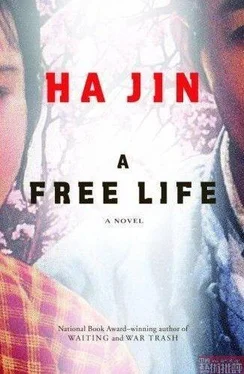"All right." Nan turned to the girl. "I'm too tired today. I just flew all the way back from America, almost twenty hours, and I'm still jet-lagged."
" America? That's beautiful. Don't you want my phone number just in case?"
"I'm a married man."
That set the whole table roaring with laughter. "We're all married men," Mengfei said, and slapped his broad forehead three times with the heel of his hand. " Nan, please don't remind us of our depravity." He stared at the girls, who turned quiet at last. A moment later they both moved to a nearby table.
On their way back, lounging in the Audi, Nan asked Danning, "Why did Mengfei tell the girl to wait until he lost another five pounds?"
"Ah, he has a theory-the intensity of sexual pleasure is in proportion to the weight you have lost." "Strange. Do you believe him?"
"Too much body fat dulls the physical sensation, doesn't it?" " I see, you fellows are experts. By the way, why did the restaurant give those common dishes all the fancy names?"
"To get more business. Everybody wants to sell and sell and sell, to make money by hook or by crook. People don't call things by their names anymore."
Then Nan asked him what kind of place was that restaurant. "It's like a brothel," he said.
His friend laughed and told him that there were many bars, salons, and hotels like that in Beijing. Using women to attract business was common practice nowadays. Nan thought of asking him whether he had often spent time with the girls, but he checked himself. Without question Danning was a regular customer; so were his friends. Nan wondered whether he himself would have become one if he lived here.
AFTER a whole night's train ride, he arrived at Harbin in the early morning. The train station had been renovated, and, with a new veranda and a massive gateway, it looked more welcoming than it had twelve years before. People here were dressed more colorfully than Beijingers, though they had much less money. The city appeared dormant and aged; the old Russian buildings in the southeast looked gray and shabby in spite of their copper cupolas. In the square before the station a few boys and girls in sweat suits were practicing martial arts, jumping around, or kicking and punching air, or directing their energy to different parts of their bodies while standing still with their knees bent at a right angle. On the west side of the square stretched a line of food stands that sold fried dough sticks, soy milk, sugar pies, jellied tofu soup, roasted beans and peanuts. Several customers sat on canvas stools there, eating breakfast while palavering or reading newspapers; a woman had a beagle on a long leash that kept wagging its docked tail. Nan flagged down a cab and set out for Nangang District, where his parents' home was located.
The city hadn't changed much. Indeed, there were more cars on the streets, but unlike in Beijing, not many of them here seemed privately owned. Nan liked the new tall buses, which looked roomy, like tourist coaches. Five minutes later he asked the taxi to stop at Friendship Boulevard, about three hundred yards away from Wind Chime Street, on which his parents lived, because he wanted to walk a little. He gave the cabbie, a young man with a missing front tooth, twenty yuan and let him keep the change. Then he headed toward his parents' home, lugging his wheeled suitcase without looking at the street signs as if his feet knew where to take him.
When he entered the residential compound, he heard a man chanting, "Breathe in, breathe out, breathe in, breathe out…" Accompanying those amplified singsong words was slow, dangling music that sounded ancient and listless. Rounding the corner of the first building, Nan caught sight of a group of old people, about thirty of them, doing morning exercises in the open space between two concrete tenements. They stepped around rhythmically, putting down heel first and swinging their arms left and right, all with their eyes half shut. They looked funny to Nan, as if sleepwalking or wrestling with shadows. Among them he saw his parents, who were swaying their shoulders indolently, his father wearing a flat brown cap while his mother was in purple slacks and a white short-sleeved shirt. To his amazement, neither of them had changed much; only their midriffs seemed thicker than before and their limbs looked a little stiff. All the people were expressionless, and their bodies moved in time with the male voice and the music as if they were in a hypnotized dance. Unconsciously Nan stopped in his tracks, his chest so full of feeling that he could hardly breathe. His eyes filmed over. Then he came around and decided not to address his parents, not to wake up the whole crowd. He went along and passed them with his face toward the wall of the building.
He climbed the stairs and reached his parents' apartment. The door was locked, so he leaned against the steel banister at the landing, waiting. His father and mother had retired several years ago with pensions equal to their full salaries, and they lived comfortably. Nan could see why, whenever he complained about the Chinese government in his letters, his father would write back upbraiding him and saying he was too naive and too rash. The old man, a staunch Communist, had never doubted the superiority of socialism to capitalism. He had once even condemned his son, saying that even though Nan lived in an American house, drove an American car, spoke American words, ate American food, and cut American farts, still all those privileges couldn't justify Nan 's "vituperation" against the Chinese government. Now Nan understood that his parents' livelihood depended on the support of the state.
"Who's there?" his mother shouted as she was climbing up the stairs.
"Mom, it's me."
" Nan! Are you really Nan?" She ran up, stumbled at a step and put out her hand to break the fall.
"Don't run." He hurried down to meet her.
She threw her arms around him and broke into happy tears. "Oh, my son, how I miss you! Are you back alone?"
In his arms, she was like a meatball with love handles. He said, "Yes, Pingping and Taotao couldn't come with me."
"Let me take a good look at you." She pushed him away a bit and observed him with creased eyes. " Nan, you're a middle-aged man now. You've changed so much. Life must be hard in America."
"It's not easy, but we've managed. You look great, Mom. I saw you and my dad outside just now, but I didn't interrupt you." They turned toward the door. Viewing her from the side, he found her more bent than before, but her hair was jet-black, apparently dyed.
"Oh, you should've stopped us," she went on. "We were doing this new breathing exercise. It's like magic and everybody feels better after doing it for a week. Hey, my old man, our son is home."
Nan 's father appeared in the stairwell. He saw Nan and hastened his steps. The moment he came in, he asked, "When did you arrive?"
"A few minutes ago."
"Why didn't you tell us beforehand?" He smiled, crinkling his weather-burned face and unable to contain his happiness.
Nan explained the raffle prize that had enabled him to fly back. His mother had already started making breakfast in the kitchen, from which the clatter of pots and bowls could be heard. Nan saw steaming water falling out of the faucet in there-that was something new.
The old man and Nan sat down on the sofas in the living room. He said to his son, "You were right not to come up to us when your mother and I were at the exercise. Uncle Zhao was right behind me. He's still unhappy with you."
"Because I didn't help him get his paintings exhibited in the United States?"
"Right."
"That was several years ago. He still bears a grudge?"
"Sometimes he complains that you're ungrateful, and I have to pretend to agree with him."
Читать дальше












